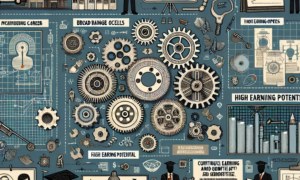What is the difference between artificial intelligence and mechanical engineering?
The main difference between artificial intelligence and mechanical engineering is that artificial intelligence involves machines that can learn and make decisions on their own, while mechanical engineering involves the design and creation of machines that rely on manual input.
Can a mechanical engineer do artificial intelligence?
Yes a mechanical engineer can do artificial intelligence.
What are the skills needed for a mechanical engineer to do artificial intelligence?
The skills needed for a mechanical engineer to do artificial intelligence may vary depending on the specific application of artificial intelligence being used. However, some basic skills that are likely to be needed include programming, data analysis, and machine learning.
How can a mechanical engineer learn artificial intelligence?
There is no one-size-fits-all answer to this question, as the best way to learn artificial intelligence (AI) depends on your specific background and interests. However, some ways to learn AI include taking online courses, attending workshops or conferences, or reading AI-related literature. Additionally, you could also work on AI projects or participate in AI-focused hackathons.
What are the applications of artificial intelligence in mechanical engineering?
Some applications of artificial intelligence in mechanical engineering are:
1. Designing and simulating products and systems
2. Identifying and diagnosing problems with products or systems
3. Predicting how products or systems will behave under different conditions
4. Planning and controlling the manufacturing process
5. Training and supervising workers
What are the challenges of using artificial intelligence in mechanical engineering?
Artificial intelligence can be used in a number of ways in mechanical engineering, but the two main challenges are programming the AI and getting it to learn effectively. Programming the AI can be difficult because it requires a deep understanding of how the AI works and what it is trying to achieve. Getting the AI to learn effectively can also be difficult because it needs to be able to understand the complexities of the problem it is trying to solve.
What are the future trends of artificial intelligence in mechanical engineering?
Some future trends of artificial intelligence in mechanical engineering include the following:
– Increasing use of artificial intelligence in design and manufacturing processes
– Development of artificial intelligence-assisted diagnostic and prognostic systems for machines and equipment
– Increasing use of artificial intelligence in predictive maintenance and fault detection
– Advances in artificial intelligence-based control systems for machines and equipment
How has artificial intelligence transformed mechanical engineering?
Artificial intelligence has transformed mechanical engineering by allowing engineers to create machines that can learn and adapt to their surroundings. This has allowed for more efficient and effective machines to be created, which has in turn led to increased efficiency and productivity in the mechanical engineering field.
What are the benefits of using artificial intelligence in mechanical engineering?
Some benefits of using artificial intelligence in mechanical engineering include:
1. Increased efficiency – With the help of AI, machines can be taught to do tasks that are repetitive and time-consuming, allowing engineers to focus on more important tasks.
2. Improved design – AI can help engineers design products that are more efficient and effective.
3. Greater accuracy – AI can help to improve the accuracy of designs and predictions.
4. Increased productivity – AI can help to speed up the design process, allowing engineers to produce more products in a shorter amount of time.
How can artificial intelligence be used to improve mechanical engineering?
Artificial intelligence can be used to improve mechanical engineering by helping to design and analyze products and systems. It can also be used to improve the efficiency and safety of products and systems.


